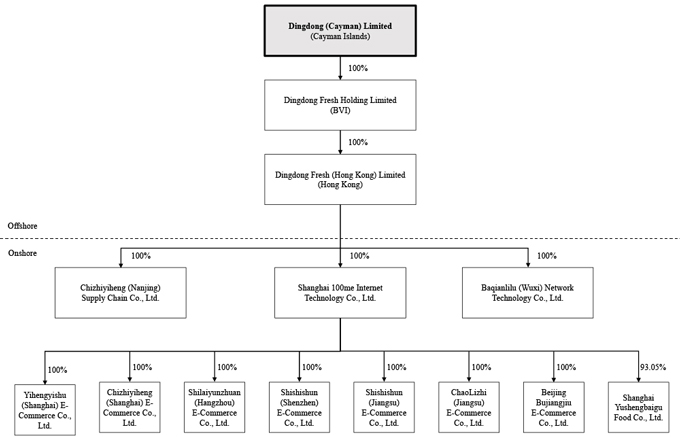The EIT Law and the implementation rules provide that an income tax rate of 10% will normally be applicable to PRC outsourced income of
“non-PRC
resident enterprises,” which (i) do not have an establishment or place of business in China or (ii) have an establishment or place of business in China, but the relevant income is not actually connected with the establishment or place of business to the extent such dividends and gains are derived from sources within China. The State Council or a tax treaty between China and the jurisdictions in which the
non-PRC
investors reside may reduce such income tax. Pursuant to an Arrangement Between the Mainland of China and the Hong Kong Special Administrative Region for the Avoidance of Double Taxation on Income and other applicable PRC laws, if a Hong Kong resident enterprise is determined by the competent PRC tax authority to have satisfied the relevant conditions and requirements, the 10% withholding tax on the dividends the Hong Kong resident enterprise receives from a PRC resident enterprise may be reduced to 5%. However, based on the Notice on Certain Issues with Respect to the Enforcement of Dividend Provisions in Tax Treaties, or SAT Circular 81, issued by SAT on February 20, 2009, if the relevant PRC tax authorities determine, in their discretion, that a company benefits from such reduced income tax rate due to a structure or arrangement that is primarily
tax-driven,
such PRC tax authorities may adjust the preferential tax treatment. Based on the Circular on Issues concerning the “Beneficial Owner” in Tax Treaties, or SAT Circular 9, issued by SAT on February 3, 2018, which became effective on April 1, 2018, a comprehensive analysis shall be conducted based on the factors set out in the present article and in combination with the actual conditions of specific cases, and certain factors which will negatively affect the determination of an applicant’s status as a “beneficial owner” are provided, such as the business activities engaged in by the applicant do not constitute substantive business activities. On October 14, 2019, SAT promulgated the Administrative Measures for
Non-Resident
Taxpayers to Enjoy Treatment under Treaties, or SAT Circular 35, which became effective on January 1, 2020. SAT Circular 35 provides that
non-PRC
resident enterprises are not required to obtain
pre-approval
from the relevant tax authorities in order to enjoy the reduced withholding tax. Instead,
non-PRC
resident enterprises and their withholding agents may, by self-assessment and on confirmation that the prescribed criteria to enjoy the tax treaty benefits are met, directly apply the reduced withholding tax rate, and include necessary forms and supporting documents in the tax filings, which will be subject to
post-tax
filing examinations by the relevant tax authorities.
On February 3, 2015, SAT issued a Public Notice Regarding Certain Enterprise Income Tax Matters on Indirect Transfer of Assets by
Non-PRC
Resident Enterprises, or SAT Public Notice 7. In December 2017, Article 13 and Paragraph 2 of Article 8 of SAT Public Notice 7 were abolished by Decision of the State Administration of Taxation on Issuing the Lists of Invalid and Abolished Tax Departmental Rules and Taxation Normative Documents effective on December 29, 2017 and the Circular on Issues concerning Withholding of Enterprise Income Tax for
Non-PRC
Resident Enterprises, or the SAT Circular 37, effective on December 1, 2017, which was amended on June 15, 2018, respectively. By promulgating and implementing these notices, the PRC tax authorities have enhanced their scrutiny over the direct or indirect transfer of equity interests in a PRC resident enterprise by a
non-PRC
resident enterprise. Pursuant to the SAT Public Notice 7, as amended, in the event that a
non-PRC
resident enterprise indirectly transfers equities and other properties of a PRC resident enterprise to evade its obligation of paying EIT by implementing arrangements that are not for reasonable commercial purpose, such indirect transfer shall be
re-identified
and recognized as a direct transfer of equities and other properties of the PRC resident enterprise. The SAT Public Notice 7, as amended, provides clear criteria for assessment of reasonable commercial purposes and has introduced safe harbors for internal group restructurings and the purchase and sale of equity through a public securities market. SAT Public Notice 7 also brings challenges to both offshore transferor and transferee (or another person who is obligated to pay for the transfer) of taxable assets. Where a
non-PRC
resident enterprise transfers taxable assets indirectly by disposing of the equity interests of an offshore holding company, which is an Indirect Transfer, the
non-PRC
resident enterprise as either transferor or transferee, or the PRC entity that directly owns the taxable assets, may report such Indirect Transfer to the relevant tax authority. Using a “substance over form” principle, the PRC tax authority may disregard the existence of the offshore holding company if it lacks a reasonable commercial purpose and was established for the purpose of reducing, avoiding or deferring PRC tax. As a result, gains derived from such Indirect Transfer may be subject to EIT, and the transferee or another person who is obligated to pay for the transfer is obligated to withhold the applicable taxes, currently at a rate of 10% for the transfer of equity interests in a PRC resident enterprise. Both the transferor and the transferee may be subject to penalties under PRC tax laws if the transferee fails to withhold the taxes and the transferor fails to pay the taxes.
